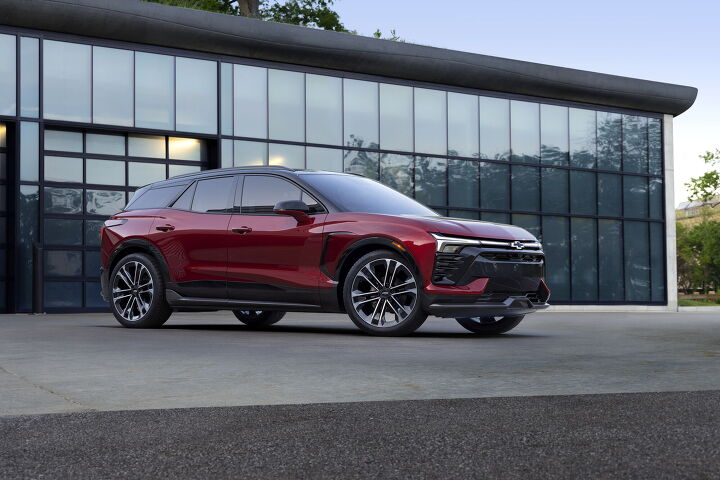The New Chevy Blazer EV Has Stumbled Twice in Recent Tests - Hard

General Motors’ fortunes are tied heavily to its new Ultium EV technology. It underpins several existing and upcoming models and is the basis of the automaker’s EV efforts, costing billions of dollars and years of development. A few Ultium-based models have already gone on sale without too many issues, including the GMC Hummer EV and Cadillac Lyriq, but the most recent release hasn’t gone so smoothly. The Chevrolet Blazer EV has recently failed in two high-profile tests by automotive publications, raising questions about its electrical system and software.
Kevin Williams at InsideEVs experienced several issues on his road trip from Ohio to North Carolina, leaving him stranded at a rural charging station. Now, Edmunds is reporting a similar experience, with its almost-new long-term Blazer EV test vehicle recording dozens of errors and weeks in the dealer repair department.
While Williams’ road trip ended with a stranded journalist and a vehicle that couldn’t complete its intended journey, Edmunds’ at least ended in its home area in Southern California. The publication saw eight warning lights during its trip between Los Angeles and San Diego.
Unlike Williams, Edmunds got a 12-volt system error, but both experienced issues charging. Both experiences also unraveled over a short period, but Edmunds recorded 23 issues requiring fixes. The publication sent its SUV to the dealer, where it’s been for more than two weeks so far, requiring support from a GM technician and surrounding stores.
The list of faults is long and won’t be all that interesting for many readers, but there are a few issues to address. The body and drive motor control modules malfunctioned, leaving “lost communication” messages with some windows, while the head-up display experienced a “general electrical malfunction.”
To be fair, this is not only a brand-new vehicle but a brand-new vehicle in a somewhat untested format for GM. People often advise against buying first-generation mobile phones and electronic devices because of the complexity involved with developing an all-new product, so, hopefully, General Motors and Chevy can address these issues with an over-the-air software update to smooth the landing a bit.
[Image: Chevrolet]
Become a TTAC insider. Get the latest news, features, TTAC takes, and everything else that gets to the truth about cars first by subscribing to our newsletter.

Chris grew up in, under, and around cars, but took the long way around to becoming an automotive writer. After a career in technology consulting and a trip through business school, Chris began writing about the automotive industry as a way to reconnect with his passion and get behind the wheel of a new car every week. He focuses on taking complex industry stories and making them digestible by any reader. Just don’t expect him to stay away from high-mileage Porsches.
More by Chris Teague
Latest Car Reviews
Read moreLatest Product Reviews
Read moreRecent Comments
- W Conrad I'm not afraid of them, but they aren't needed for everyone or everywhere. Long haul and highway driving sure, but in the city, nope.
- Jalop1991 In a manner similar to PHEV being the correct answer, I declare RPVs to be the correct answer here.We're doing it with certain aircraft; why not with cars on the ground, using hardware and tools like Telsa's "FSD" or GM's "SuperCruise" as the base?Take the local Uber driver out of the car, and put him in a professional centralized environment from where he drives me around. The system and the individual car can have awareness as well as gates, but he's responsible for the driving.Put the tech into my car, and let me buy it as needed. I need someone else to drive me home; hit the button and voila, I've hired a driver for the moment. I don't want to drive 11 hours to my vacation spot; hire the remote pilot for that. When I get there, I have my car and he's still at his normal location, piloting cars for other people.The system would allow for driver rest period, like what's required for truckers, so I might end up with multiple people driving me to the coast. I don't care. And they don't have to be physically with me, therefore they can be way cheaper.Charge taxi-type per-mile rates. For long drives, offer per-trip rates. Offer subscriptions, including miles/hours. Whatever.(And for grins, dress the remote pilots all as Johnnie.)Start this out with big rigs. Take the trucker away from the long haul driving, and let him be there for emergencies and the short haul parts of the trip.And in a manner similar to PHEVs being discredited, I fully expect to be razzed for this brilliant idea (not unlike how Alan Kay wasn't recognized until many many years later for his Dynabook vision).
- B-BodyBuick84 Not afraid of AV's as I highly doubt they will ever be %100 viable for our roads. Stop-and-go downtown city or rush hour highway traffic? I can see that, but otherwise there's simply too many variables. Bad weather conditions, faded road lines or markings, reflective surfaces with glare, etc. There's also the issue of cultural norms. About a decade ago there was actually an online test called 'The Morality Machine' one could do online where you were in control of an AV and choose what action to take when a crash was inevitable. I think something like 2.5 million people across the world participated? For example, do you hit and most likely kill the elderly couple strolling across the crosswalk or crash the vehicle into a cement barrier and almost certainly cause the death of the vehicle occupants? What if it's a parent and child? In N. America 98% of people choose to hit the elderly couple and save themselves while in Asia, the exact opposite happened where 98% choose to hit the parent and child. Why? Cultural differences. Asia puts a lot of emphasis on respecting their elderly while N. America has a culture of 'save/ protect the children'. Are these AV's going to respect that culture? Is a VW Jetta or Buick Envision AV going to have different programming depending on whether it's sold in Canada or Taiwan? how's that going to effect legislation and legal battles when a crash inevitibly does happen? These are the true barriers to mass AV adoption, and in the 10 years since that test came out, there has been zero answers or progress on this matter. So no, I'm not afraid of AV's simply because with the exception of a few specific situations, most avenues are going to prove to be a dead-end for automakers.
- Mike Bradley Autonomous cars were developed in Silicon Valley. For new products there, the standard business plan is to put a barely-functioning product on the market right away and wait for the early-adopter customers to find the flaws. That's exactly what's happened. Detroit's plan is pretty much the opposite, but Detroit isn't developing this product. That's why dealers, for instance, haven't been trained in the cars.
- Dartman https://apnews.com/article/artificial-intelligence-fighter-jets-air-force-6a1100c96a73ca9b7f41cbd6a2753fdaAutonomous/Ai is here now. The question is implementation and acceptance.


































Comments
Join the conversation
This is just in. GM is delaying the Blazer EV due to software issues. We probably won't see the Blazer EV in showrooms until the spring. GM is making Tesla look like Toyota when it comes to reliability. Toyota is getting the last laugh at GM's expense.
Read the new release below.
https://www.msn.com/en-us/autos/news/gm-stops-selling-the-chevy-blazer-ev-to-deal-with-software-quality-issues/ar-AA1lWUOK
Nice looking car, too bad. They should have held it back longer and worked all the bugs out. It looks so good I would actually consider one, but...